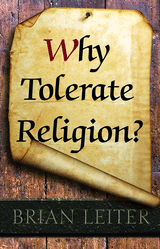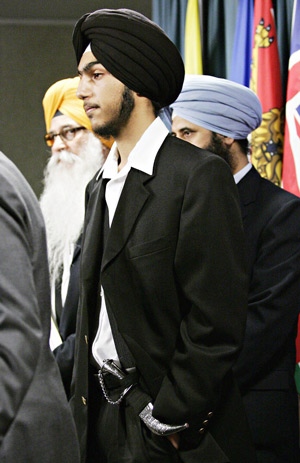In looking into philosophical perspectives on the “proper” role of religion in politics, a few weeks ago I stumbled over the work of Brian Leiter on the subject. This was a fortuitous discovery in terms of providing me with a quality example of the sort of discourse which is respected in the field in which I am doing my dissertation. For other purposes it seems to be an example of how painfully wrong-headed thinking can be presented in excellent style.
 The book of Leiter’s that I have out of the library at present is entitled Why Tolerate Religion?, published last year by Princeton University Press. Its approach is primarily that of judicial philosophy: considering the subject of what sort of approach to the subject would be most just from an international law perspective. The practical case that he focuses on is one of a Sikh boy in Canada who considers it to be his religious duty to carry a small but deadly bladed weapon –– his ceremonial kirpan –– to school with him each day, in spite of the school’s blanket prohibition on students carrying weapons to school with them. For the Canadian court this was actually a bit of a no-brainer: the rule was established to insure student safety, and never in the history of Canada has a Sikh used his kirpan offensively against any fellow student or citizen, thus allowing a devout Sikh student to carry one poses no significant threat to the safety the rule was established to protect. Beyond that it was unanimously recognized by the high court judges as a healthy part of the young man’s social, moral and religious identity, which Canadian and international law goes to great length to protect.
The book of Leiter’s that I have out of the library at present is entitled Why Tolerate Religion?, published last year by Princeton University Press. Its approach is primarily that of judicial philosophy: considering the subject of what sort of approach to the subject would be most just from an international law perspective. The practical case that he focuses on is one of a Sikh boy in Canada who considers it to be his religious duty to carry a small but deadly bladed weapon –– his ceremonial kirpan –– to school with him each day, in spite of the school’s blanket prohibition on students carrying weapons to school with them. For the Canadian court this was actually a bit of a no-brainer: the rule was established to insure student safety, and never in the history of Canada has a Sikh used his kirpan offensively against any fellow student or citizen, thus allowing a devout Sikh student to carry one poses no significant threat to the safety the rule was established to protect. Beyond that it was unanimously recognized by the high court judges as a healthy part of the young man’s social, moral and religious identity, which Canadian and international law goes to great length to protect.

Leiter, however, has a bit of a problem with the principle of the matter. Why is it that such provisions are made just for religious folk? What makes religion so special as a legal and political factor? Why can’t any kid who has a major existential and traditional commitment to his blade carry one to school?
His way of further exploring the issue gets more and more problematic as he goes along. The decisive wrong turn he takes in chapter 2 is, setting aside Durkheim and the rest of the sociological tradition which follows, to define religion in general in a particularly hostile manner: Religion is the field where things are taken as “matters of faith”, which, siting legal philosopher Timothy Macklem, Leiter takes to be things, “where the quest for reasons is impossible but commitment [even without reasons] is potentially valuable” (pp. 31-2, bracketed phrase Leiter’s). On this basis Leiter’s essential definition for religion (p. 34) is essentially anything which 1) issues categorical demands for action, and 2) does not answer to evidence or reason. Given that essential definition for the entity he stands in opposition to, it is hardly surprising that he comes to the conclusion that legal provisions for the toleration of such are philosophically not justified.
Leiter’s negative perspective becomes somewhat more understandable when it is placed in the context of his personal negative experiences in Texas, which he states outright in the preface: “My interest in the topic of religious toleration arose when teaching at the University of Texas–Austin and witnessing in the years 2001 to 2008 the pernicious influence of reactionary Christians on both politics and public education in the state.” (p. ix) In exploring the realm of religious culpability in political matters he goes as far as saying, “religious believers overwhelmingly supported George W. Bush, widely considered one of the worst presidents in the history of the United States, whom many think ought to be held morally culpable for the illegal war of aggression against Iraq as well as the casualties resulting from domestic mismanagement.”
It is not hard to see where his negative perspective on the matter comes from then. Jeffrey Stout comments that his difference of perspective on religion in politics with his fellow Princetonian philosopher of the subject, Richard Rorty, primarily stemmed from the fact that Stout viewed religious influences in politics through the lens of Martin Luther King, Jr. and Desmond Tutu, while Rorty viewed them through the lens of Jerry Falwell and Pat Robertson. I would thus agree with Leiter in one particular unstated premise of his work: many politicians who have used Christianity as a demagogic tool in the political process, and many of the rank and file of the “religious right” who follow them, have a distinct tendency to make asses out of themselves.
Setting aside this particular cultural problem for the time being, however, let’s go back to the basic matter of what makes religion religion, particularly in legal terms. The obvious, and obviously outdated, definitions on the subject have to do with belief in God or gods. In de facto legal matters questions of religious rights and requirements for religious tolerance always essentially come back to what people understand as, in James Madison’s words, “duties that we owe to our Creator, and the manner of discharging them.” We all know that Buddhism officially counts as a religion without believing in the relevance of a creator to our day-to-day moral lives, but that doesn’t really change the essence of the issue in legal or philosophical terms: karma provides an essential philosophical place-holder for God in this given system, thus implying a certain requirement of respect for that traditional understanding of the universe on much the same grounds as for those who believe in more active divinities. The primary point is that there are transcendent bases for our particular moral actions, based on factors that really can’t be reduced down to a strictly materialist perspective.
Another aspect of religion as religion that is particularly relevant here is that it is a communal phenomenon, never merely a manner of personal spiritual experiences. St. Paul speaks of the community of Christian believers as analogously forming a “body” which takes on the role of being “the bride of Christ”. Refusal to associate with others in that same “body” makes one’s Christian identity as such somewhat subject to question. And in this respect it should be pointed out that Christianity is quite certainly the most individualistic of all significant world religions; if Christianity has this communal aspect built into its very fiber, a fortiori other religions certainly do as well. No system which does not equip people to relate constructively not only to their understanding of God, or whatever else is “out there”, but also to their fellow man –– “brothers and sisters in faith” or otherwise –– deserves the title of “religion”.
A third factor which, especially in sociological terms, is essential to the definition of religion, is a multi-generational tradition. Some group which is just starting out, worshipping someone, or worshipping according to the principles laid out by someone who is still alive or who has died less than a generation or two ago, doesn’t technically get to call itself a religion; they are still just a “cult”. That doesn’t have to be a pejorative term, other than in indicating the fact that the belief in question has yet to stand the test of time and enable its community of believers to thrive within their given social environments. Questions of what legal rights cults should be entitled to as such are, strictly speaking, matters of freedom of conscience more than freedom of religion. That may not make a great difference in terms of moral philosophy, but in terms of judicial decision making it can have some rather important implications.
If we change around this fundamental definition of what counts as religion in this way it essentially screws up Leiter’s whole argument against taking religious toleration as a foundational principle in moral and legal philosophy, but it combines with some of his other arguments in ways that lead to interesting conclusions that Leiter hasn’t really taken into account. Primary among these is the virtue of tolerance as tolerance. Tolerance as a virtue is, by definition, a matter of respecting compromise for its own sake. If I am entirely indifferent towards some particular practice, such as my Muslim friends’ religious practice of always putting on their right shoe first in the morning, then there is no justification for speaking of “toleration” in that context. Likewise if I compromise with someone merely because I am not in a secure position from which to overpower and completely subdue them, then that is not exercising any essential social virtue; it is merely a matter of calculating the maximum realization of my selfish personal interest in what I see as non-ideal situations.
Leiter effectively lays out three essential arguments for what he calls “principled toleration” in this sense: toleration as an ideal state of affairs rather than as a matter of indifference or as a strategic position taken for lack of capacity to completely dominate the other. The first is taken from John Rawls’ Theory of Justice, essentially assuming that religious and moral values are things we are socialized into, with little choice in the matter, thus becoming an involuntary aspect of who each of us is as a person to the same extent as skin color, handedness and raw athletic capacities. On this basis it would make sense for someone entering into the “game” of human life without knowing what “cards they will be dealt” in this regard, to agree ahead of time to a rule according to which rejection of the other person based on religious identity would not be allowed. This would also include a provision that religious majorities should grant certain basic rights to religious minorities. To do otherwise would be just as unjust as penalizing “lefties” or red-heads or tall people for having those characteristics.
Rawls’ argument is a deontological one –– based on understandings of moral principle for its own sake. The other arguments (or broad categories of argument) that Leiter lays out are more utilitarian: based on providing the greatest pleasure to the greatest number of people in practice. First among these is the assertion that freedom is an important aspect of satisfaction in human life unto itself. In some ways, as applied to religious or other moral convictions, this runs contrary to the essential deontological argument given above: if people really are able to choose what they believe to be right or wrong on transcendent bases, then there is no point in making provisions for acceptance of what were assumed to be involuntary matters of personal and social identity. But given the uncertainty we are left with in regard to the extent to which we are able to choose anything in practice, and given the extent to which at least an illusion of being able to determine our own destinies remains an important motivational factor in human psychology, it is not unreasonable to leave both justifications in play without them cancelling each other out.
Leiter’s third potential argument for principled toleration of religious difference is based on John Stuart Mill’s On Liberty, which he labels as the epistemic argument for toleration. It basically says that 1) processes of moral learning serve to increase overall human happiness, and 2) proper moral learning can only take place in an atmosphere of some accepted diversity –– where there are possibilities of choosing between what we come to see as better and worse options, none of which are strictly excluded. Thus leaving the door open to various “experiments in living” is an essential aspect of increasing human happiness by way of enabling people to discover the sorts of “moral truth” that cannot be arrived at merely by means of authoritative instruction.
Leiter’s negative attitude towards the value of religion as such keeps him from accepting the idea that religious beliefs are worthy of special toleration on the above grounds, but again, that comes as no serious surprise. The practical issues in question essentially fall into two categories: 1) Under what circumstances should people be granted exceptions from otherwise universally applicable rules based on their religious beliefs? And 2) Under what circumstances can we consider particular laws to be unjustifiable based on their intent to violate the religious convictions of particular groups? Setting aside the sensitive issues of Leiter’s resentments towards Bush fans, the go-to practical examples here are, respectively, Canada’s acceptance of Sikh kirpans in schools and France’s ban of Islamic headscarves in schools. Without going through the details of his arguments against religion as a basis for judicial decision-making on these matters, let me close here by giving my own semi-religious perspective on such matters.
 Exceptions to rules need to be granted all the time, and not merely on religious grounds, but religious grounds provide some of the strongest grounds for making such exceptions. I teach teenagers in a public school, so I here imaginative pleas for exceptions to established rules based on all sorts of premises pretty much daily. There are rules requiring students to be present (and on time) for all basic lesson periods. There are rules regarding the level of work students should be expected to do at home between lessons. There are rules regarding when students are allowed off of school premises during the school day. There are rules regarding when students are allowed within school buildings for purposes other than attending classes (mandatory outside recess periods). Rarely does a working day go by for me without some student appealing to me to allow an exception to one or another of these rules. All of these pleas, when they go beyond the level of “Pleeeaase Mr. Huisjen!” have a certain common structure of 1) acknowledging the essential purpose of the rule, 2) presenting some factor of greater personal or moral importance than the factor which the rule is intended to safeguard, and 3) making a case for the exception being small enough so as not to endanger the principle which the rule has been instituted to protect. In these regards the level of discretion that I must exercise as part of my work is not essentially any different from that which any policeman or judge must exercise. Our own human psychological limitations will always come into play, but as matters of principle we can generally tell when those three bases for a valid excuse are being met and when they are not. Given the nature of religion as I see it, I have no problem with students having time off to observe religious festivals that are not built into our school calendar because they concern small minorities within the school community, or with Muslim kids staying inside to do their salat together on part of their outside recess break, or any other minor infringement of school rules based on their families’ religious practices. In terms of their role in enforcing respect for tradition transcendent standards for morality and social participation, I see religious observations as doing far more good than harm. If, like Leiter, I saw them merely as irrational cultural practices childishly demanding to have their own way, I might be less charitable, but in this matter I believe he is just categorically wrong.
Exceptions to rules need to be granted all the time, and not merely on religious grounds, but religious grounds provide some of the strongest grounds for making such exceptions. I teach teenagers in a public school, so I here imaginative pleas for exceptions to established rules based on all sorts of premises pretty much daily. There are rules requiring students to be present (and on time) for all basic lesson periods. There are rules regarding the level of work students should be expected to do at home between lessons. There are rules regarding when students are allowed off of school premises during the school day. There are rules regarding when students are allowed within school buildings for purposes other than attending classes (mandatory outside recess periods). Rarely does a working day go by for me without some student appealing to me to allow an exception to one or another of these rules. All of these pleas, when they go beyond the level of “Pleeeaase Mr. Huisjen!” have a certain common structure of 1) acknowledging the essential purpose of the rule, 2) presenting some factor of greater personal or moral importance than the factor which the rule is intended to safeguard, and 3) making a case for the exception being small enough so as not to endanger the principle which the rule has been instituted to protect. In these regards the level of discretion that I must exercise as part of my work is not essentially any different from that which any policeman or judge must exercise. Our own human psychological limitations will always come into play, but as matters of principle we can generally tell when those three bases for a valid excuse are being met and when they are not. Given the nature of religion as I see it, I have no problem with students having time off to observe religious festivals that are not built into our school calendar because they concern small minorities within the school community, or with Muslim kids staying inside to do their salat together on part of their outside recess break, or any other minor infringement of school rules based on their families’ religious practices. In terms of their role in enforcing respect for tradition transcendent standards for morality and social participation, I see religious observations as doing far more good than harm. If, like Leiter, I saw them merely as irrational cultural practices childishly demanding to have their own way, I might be less charitable, but in this matter I believe he is just categorically wrong.
When it comes to rules being instituted with specific prejudice against given religious groups, I believe the case is more complex, involving the balance between religious identity and broader social solidarity on the one hand, and between the utility associated with given religious practices according to religious teachings themselves and the harm that comes about through their practice on the other. Thus I strongly support laws against female genital cutting of any sort, regardless of religious justifications for such; in part because it is a matter of physically altering the girl for purpose of keeping her within the religious/tribal community, in part because the physical harm caused far outweighs any purported benefits brought about by such an operation. Just because some claim that it is a religious procedure does not, in my considered opinion, justify its tolerance or continuation. If laws against it seem to target some particular religious group, so be it.
 Yet when it comes to the famous headscarf ban, I find this rule clearly unjustified. The religious motivation at issue is admittedly somewhat questionable: an assumption that for a woman to reveal her hair in public is a means of drawing masculine attention, in ways that may cause problematic responses from the men in question. I don’t believe there is any justification for men making unwanted sexual advances towards women based on their hair being exposed. The very thought strikes me as absurd, regardless of its having been dignified by various Islamic mullahs over the centuries. But that does not mean that I accept a prohibition on women modestly covering their hair, based in part on their sense of religious identity, to be justifiable either.
Yet when it comes to the famous headscarf ban, I find this rule clearly unjustified. The religious motivation at issue is admittedly somewhat questionable: an assumption that for a woman to reveal her hair in public is a means of drawing masculine attention, in ways that may cause problematic responses from the men in question. I don’t believe there is any justification for men making unwanted sexual advances towards women based on their hair being exposed. The very thought strikes me as absurd, regardless of its having been dignified by various Islamic mullahs over the centuries. But that does not mean that I accept a prohibition on women modestly covering their hair, based in part on their sense of religious identity, to be justifiable either.
Along the same lines, I believe that if women wish to dress in such a way that the outlines of their nipples are visible through their clothing, that may reflect a particularly edgy intent on their part, and there may be good reasons to institute dress codes against that level of exposure in some cases, but their choice to dress that way is not a justification for any masculine lack of restraint in approaching them. I fully support the ethic behind “slut walks” to shame those who would blame women for violence against them based on how they choose to dress. But that being said, even though I do not see many of the religious arguments mandating the wearing of padded bras and/or thicker sweaters to be rationally justifiable, I would certainly not support a dress code which forces girls to make keep their nipples visible regardless of any religiously instituted cultural modesty requirements they might wish to observe to the contrary! To me the headscarf ban really makes no more sense than that.
Questions of what is essential and what is incidental to any given religion will always be subject to debate, both within the religion in question and among its outsiders. A fortiori, what is essential and what is incidental to religion in general is also going to be somewhat contentious in many contexts. This does not justify making straw men out of religious values for attack as Leiter has done. I would agree that there are many times when tolerance should not be limited to religious matters, but it that does not follow from there that religion should not be a very specific basis for toleration.
For the rest, I’ll leave it between those who believe differently than I do and their God (or whatever else they believe in).

